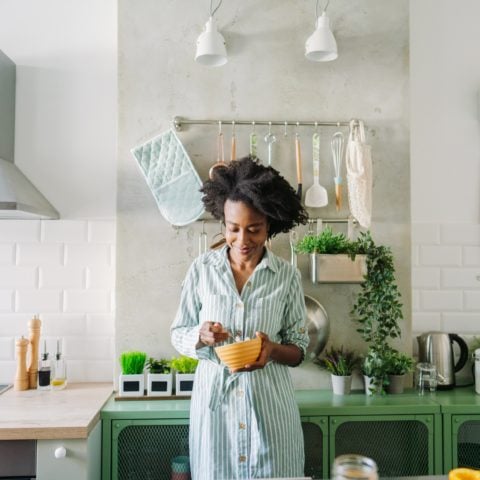Why your healthy eating habits could be making you sick

Many people think there’s no such thing as eating too healthfully. In principle, that’s true, but unfortunately these days eating well is akin to keeping up with the Joneses: we want the greenest juice, most alkaline salad and coolest eating regimen. And while, certainly, there’s a benefit to eating and drinking lots of fruits and vegetables, and eliminating processed foods, when someone starts spending too much of their days planning their next meals and feeling guilt over imperfect food choices, it’s a sign of an unhealthy food fixation called orthorexia. Jordan Younger is known to many as The Balanced Blonde, but she was once insta-famous for being The Blonde Vegan. When her obsession with living the healthiest life led her to dark places, she switched her moniker and her outlook. Here, she chimes in on what you need to know about orthorexia.
What is orthorexia?
This illness is characterized by having strict food rules based around “healthy” or “clean” foods that disrupts one’s life. While eating Paleo or vegan or gluten-free can be fine for some people, for those with orthorexia, finding a “clean” meal can become the sole focus of the day. For Younger, it manifested itself in a growing list of forbidden foods. “I had developed many fears surrounding food, and I was becoming more and more limited in what I was comfortable eating,” she says. “It was easy to hide behind the shield of veganism when I was at a restaurant with friends or even when I was grocery shopping for myself. Anything that wasn’t completely clean, oil-free, sugar-free, gluten-free and plant-based I dismissed because it wasn’t within the dietary label I had given myself.”
How do you know when your healthy eating goes too far?
While many people can reasonably follow a vegan, gluten-free or Paleo diet, those with orthorexia can’t stray from their eating regimens without feeling a tremendous amount of guilt and/or anxiety. “I knew I developed a serious problem when [a friend and I] went to a juice bar near my apartment,” says Younger. “I knew which juice I wanted—a green juice with no fruit in it—and when we got there, they were out of that particular juice. Even though there were several other green juices, smoothies and raw food options to choose from, I felt completely panicked by the thought of eating or drinking something I hadn’t ‘planned.’ Instead of choosing another juice and going with the flow, I insisted that we walk a mile out of our way to the juice bar’s other location to get the juice I wanted. My body was already starving from days of restriction and crying out to me that walking a mile without any sustenance would be a bad idea, but I did it anyway. I was determined, and being unable to shake that feeling scared me.”
How to maintain balance
There’s a fine line between healthful and harmful. A lot of people just feel good without sugar, for instance, or prefer a wheat-free diet. All of this is fine, as long as one is able to accept that it’s OK to slip up sometimes, without getting hung up on it. Younger has conquered her food fears for the most part, and now has a new lease on her nutritional life. “Everything in moderation, being kind to myself, forgiving myself and others when things don’t go perfectly well—sometimes the donut is just too good to pass up, even though I’m gluten-intolerant and sugar makes me feel bleh—and letting go of that quality of perfectionism has been huge for me. Also listening to my body and knowing what works for me instead of trying to emulate what works for someone else.”
What to do if you think you have orthorexia
While orthorexia isn’t officially recognized as an eating disorder yet in the Diagnostics and Statistical Manual of Mental Disorders (the bible of mental illnesses), it is absolutely real and you can get help through support groups, a therapist or a helpline. “Don’t compare yourself to others, trust your body and your intuition and know that you are 10 times stronger than you think you are,” says Younger. “Focus on small victories. Don’t beat yourself up over a bad day. The most helpful thing for me has been learning to trust myself and also to spend less time planning meals and thinking about food overall. It’s a day-to-day struggle, but every ounce of trying helps.”








